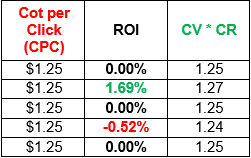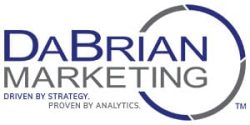Step 1: Understanding ROI of Your PPC
Return (or Value) on Investment (Cost) is easy enough to understand, but applying the concept to PPC can be tricky. Before going further, you MUST have Conversion Tracking setup on your PPC. Without tracking Conversions, there is no way to measure the Return (Value) of your PPC efforts. Once you have Conversion Tracking set up and have assigned a monetary Value per Conversion, measuring the value of your PPC becomes easy. As for Cost, it is already measured for you within AdWords.
Now that we have the Return (Value) and Investment (Cost), ROI is a simple division problem away. But, do you really understand how you earned the value and where the cost went? The next step is breaking down the components that contribute to the ROI equation.
Step 2: The Marginal Parts to Value and Cost
Cost is simply broken down into CPC or Cost per Click. While not every click is going to Cost the same, you will have an average CPC, which AdWords calculates for you, that can be used here. In a similar manner, Value can be broken down into Value per Conversion (from here on will be CV). This is very easy if you only have one Conversion type, but still doable with multiple Conversions (by using an average CV). When looking at the margin Cost and Value, we need a metric to tie the two together, which is where your Conversion Rate (CR), which is Conversions per Clicks, helps us.
At the breakeven point, your CPC = CV * CR. This also means that as long as CPC is less than CV * CR, you have a positive ROI. Below is a table illustrating the relationship of these metrics.

Taking a deeper look at this table, one will notice that whenever the CR drops below 10% the Campaign is in the red, but a CR above 10% brings it into the black, and while the CR is exactly 10% the Campaign is at its breakeven point. The next table uses the same figures but only includes the CPC, CV * CR, and ROI columns.

By looking at CPC and CV * CR, we can determine if a campaign has a positive ROI. Let us look at the final step, which is optimizing your Campaigns to boost your ROI.
Step 3: Boost PPC ROI
Since there are two sides to this equation, there are two methods to boosting ROI.
1) Reduce CPC
2) Increase CV and/or CR
CPC can be reduced a few different ways. The quickest is to lower bids or pause keywords with high CPCs. Of course, it’s best to keep the ones that are earning Conversions, because we do not want to lower the value side of the equation. Another method is to increase your Quality Score. A higher Quality Score allows you to pay less without losing Ad Rank (or Ad Position). Making sure that your Ad Copy and Landing Page content are relevant and even includes your top performing keywords will help boost your Quality Score.
Next is increasing CV and/or CR. Since Conversion Value is more often a fixed amount, I am going to focus on Conversion Rate. Begin by making sure your Landing Page clearly tells the visitor what the desire action (Conversion) is and the next step to take to accomplish it. Next, include a clear call to action within the Ad Copy (i.e. Buy Online, Sign Up or Register). Lastly, confirm that your keywords and other settings are reaching the right target audience. If you want people make a purchase, then people just looking for information are not within your target audience. Ensuring that you are getting your Ads in front of the right audience will help increase CR and boost ROI.
A Quick Recap
Just knowing the ROI percentage of your PPC, whether it is positive or negative, is not enough. You must really understand how and why your PPC earned (or failed to earn) its ROI. By breaking the equation down into the marginal metrics (CPC and CV) and tying the metrics together with Conversions Rate, you can tell if your ROI is positive or negative. Then, the next step is to improve it. Is your Cost side too high? Then start working on lowering the CPC. On the other hand, is your value lacking? Look at targeting settings, Ad Copy, and Landing Pages to make sure you are guiding the right audience all the way through your Conversions Funnel.

Leave a Reply